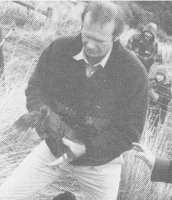 Staff at the Department of Conservation (DoC) have a joke they often share with each other: What's the best way to eradicate possums? Answer: Give them to DoC to protect. Yesterday's meditation on the relative superiority of private efforts in constructing public projects is also reflected in the superiority of many private conservation efforts over those presided over by the Department.
Staff at the Department of Conservation (DoC) have a joke they often share with each other: What's the best way to eradicate possums? Answer: Give them to DoC to protect. Yesterday's meditation on the relative superiority of private efforts in constructing public projects is also reflected in the superiority of many private conservation efforts over those presided over by the Department.Roger Beattie (pictured right) and his wife run a 20-hectare, predator-proof, buff weka reserve on the Banks Peninsula, and he tells a fascinating tale about DoC efforts to discourage the Beatties even while DoC staff themselves kept killing weka on the Chathams. He concludes:
We have spent more time and effort fighting bureaucrats than saving wildlife. I believe DOC would rather have native species die out than be saved privately. DOC has a vested interest in endangered species.
Roger talked about the failures of DoC and the setting up of his weka conservancy in The Free Radical back in 1994. Here's a link to a scans of page 1, and page 2. Beattie points out that government-run operations like the Mt Bruce Endangered Species Unit have "a vested interest in keeping native birds endangered," and says "the best way to get conservation thriving in New Zealand is to make it turn a profit." Quite right. If people value conservation -- if they really and truly value it -- then that value will be reflected in their wallets.
The Karori Wildlife Sanctuary is one place relying on that support, and by all accounts are achieving great success. (I'd love to hear more accounts from anyone involved: Crog?). And it's the same story told by Dr Graham Webb in Darwin, who says that farming endangered animals is the best way to protect them. "At the very least," he says in an article titled 'Eat Them, Skin Them, Save Them', "you can give landowners some commercial incentive to pursue conservation more than they are able to do today."
Quite right.
3 comments:
I think the Sanctuary pulls down one dichotomy held by many people: That conservation can't be conservation if people enjoy it!
It seems many people think land can either be good for the wildlife (by keeping the people off) or good for the people (by destroying the wildlife).
I think the Sanctuary shows that there can be a place that is good for conservation and education, but which people can still enjoy and are willing to pay for.
People can walk for free at at least two bush reserves within 10 minutes, but I keep signing up 10 new members every day I'm on. That's saying something.
Good point CD. Whereas DoC operate a policy of excluding people from their conservancies (which, incidentally, gives DoC staff some great places in which to holiday), as you say, by contrast the Karori Sanctuary encourages people to come in and enjoy the conservancy.
There's a TFR story here, I can feel it. Like to write it up? :-)
Too much PC crap. If a private individual of company is actively trying to conserve and protect NZ endangered species, then as long as it is for the better of the species it should be allowed.
Post a Comment